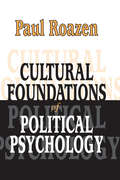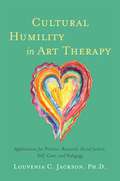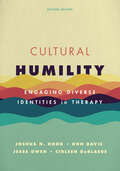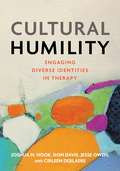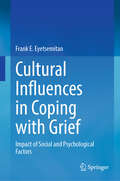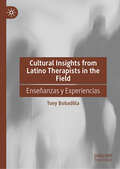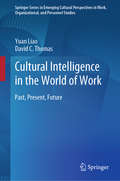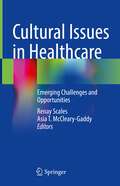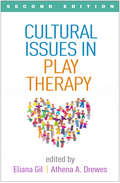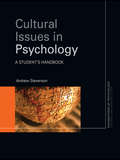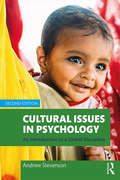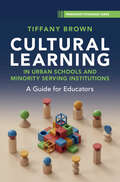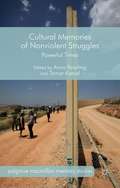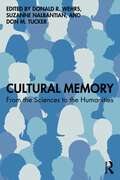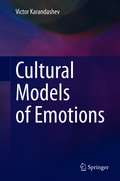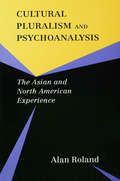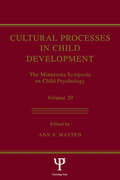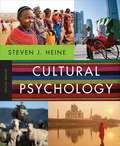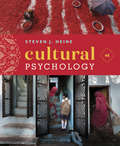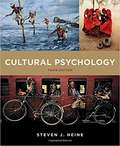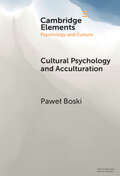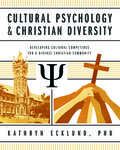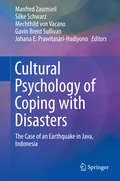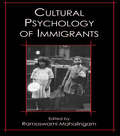- Table View
- List View
Cultural Foundations of Political Psychology: Political Psychology
by Paul RoazenOver the centuries all of the great philosophers made psychology central to understanding social life. Indeed, the ancient Greeks thought it impossible to conceive of political life without insight into the human soul. Yet insuffficient professional legitimization attaches to the central importance of modern depth psychology in understanding politics. Cultural Foundations of Political Psychology explores the linkages between psychology and politics, focusing on how rival conceptions of the good life and unspoken moral purposes in the social sciences have led to sectarian intolerance.Roazen has always approached the history of psychoanalysis with the conviction that ethical issues are implicit in every clinical encounter. Thus, his opening chapter on Erich Fromm's exclusion from the International Psychoanalytic Association touches on a host of political matters, including collaboration as opposed to resistance to Nazi tyranny. Roazen also brings a public/private perspective to such well-known episodes as the Hiss/Chambers case, the circumstances of Virginia Woolf's madness and suicide, and the matter of CIA funding of the monthly Encounter. He deals with the reaction to psychoanalysis on the part of three major philosophers--Althusser, Wittgenstein, and Buber--and looks at the link between psychology and politics in the work of such political theorists as Machiavelli, Rousseau, Burke, Tocqueville, Berlin, and Arendt. A chapter grappling with Vietnam and the Cold War illustrates how political psychology should be concerned with questions of an ethical or "ought" character.In examining the social and psychological bases for political theorizing, Roazen shows how both psychology and politics must change and redefine their methodologies as a result of their interaction. Roazen concludes with a chapter on how political psychology must deal with issues posed by changing conceptions of femininity. This volume is a pioneering exploration of the intersection of psychology and politics.
Cultural Humility in Art Therapy: Applications for Practice, Research, Social Justice, Self-Care, and Pedagogy
by Louvenia JacksonIntroducing the concept of cultural humility, this guide offers a new perspective to the field of art therapy practice and theory. It explores cultural humility in art therapy research and assessment, clinical and community-based practice, social justice, self-care and pedagogy.The notion of cultural humility addresses the power differential and encourages individuals and institutions to examine privilege within social constructs. It emphasizes self-reflection and the ability of knowing one's self in order to allow the art therapist to appropriately interact with their client, whilst being mindful of their own bias, assumptions and beliefs. Each chapter ends with a reflective exercise.Offering practical guidance to this increasingly recognised concept, Cultural Humility in Art Therapy is essential to those wanting to move toward an unbiased social justice.
Cultural Humility: Engaging Diverse Identities in Therapy
by Joshua N. Hook Don Davis Jesse Owen Cirleen DeBlaereCultural Humility offers a practical approach for meaningfully engaging cultural identities in therapy, to promote connection and growth in work with clients from a variety of backgrounds. Aligns with APA Divisions 38 and 50. The authors provide a therapeutic framework that integrates and contextualizes clinical training with the cultural issues and dynamics that arise in therapy. This fully updated second edition incorporates updated theory and research, and provides additional recommendations for how therapists from marginalized groups can navigate issues related to culture in the therapy room. The authors offer new resources to demonstrate how cultural humility and a multicultural orientation (MCO) can help therapists pinpoint and address the systemic and structural issues that can make therapy a difficult experience for many clients. Newly updated and enhanced case examples and activities are included throughout. The MCO framework involves three components—cultural humility, cultural opportunities, and cultural comfort—which together enable mental health providers to integrate culture into the therapeutic process. The first part of the book introduces the MCO framework, and outlines strategies for working to improve one&’s level of cultural humility and comfort in working with diverse clients, as well as the ability to recognize and engage cultural opportunities in therapy. The second part of the book illustrates the integration of the MCO model with key therapeutic processes, including developing a strong working alliance, navigating value differences, repairing the relationship after cultural ruptures, and working within one&’s limitations. Supplemental content to support instructor teaching is also available on the book&’s website, including companion exercises and resources, lecture slides, a sample syllabus, and glossary of key terms.
Cultural Humility: Engaging Diverse Identities in Therapy
by Joshua N. Hook; Don Davis; Jesse Owen; Cirleen DeblaereMany mental health practitioners (MHPs) today recognize and affirm the importance of cultural background -- race, ethnicity, gender, sexuality -- in their clients' lives. But many MHPs struggle to address cultural issues in practice, whether because of unfamiliarity, or fear of giving offense, or because the presence of cultural differences or similarities between client and therapist that can make it difficult to view the client objectively.
Cultural Influences in Coping with Grief: Impact of Social and Psychological Factors
by Frank E. EyetsemitanThis book appeals to scholars and students interested in culture and bereavement. Bereavement occurs in a socio-cultural context, which helps to provide an understanding of how people would cope with grief, accordingly. For example, coping with grief in the context of the workplace would be different than coping with grief in the case of a spousal loss. When compared to competing books, this book&’s approach is unique. Topics covered include widowhood, abortion, death anxiety, dying experience, workplace bereavement, resilience, disenfranchised grief, and grief rituals. Unlike competing books, culture is given prominence beyond religion, in coping with grief.
Cultural Insights from Latino Therapists in the Field: Enseñanzas y Experiencias
by Tony BobadillaThis book offers a unique glimpse into the world of culturally diverse psychotherapists by exploring the professional experiences of Latino clinicians. Through their narratives, these therapists provide distinct and essential case studies that emphasize the significance of their identities as catalysts for transformation within the field of mental health. Rich with real-world examples, this book captures pivotal moments in the lives of these therapists, presented in narrative or testimonio formats. By incorporating these personal experiences, the book contributes significantly to the processes of decolonization and the re-centering of power within marginalized communities. It acknowledges the complex dynamics these individuals navigate as they interact with various systems, offering fertile ground for growth and change. These clinicians represent a range of identities, including first-generation immigrants, individuals from low socioeconomic backgrounds, first-generation college attendees, Latinx individuals, bilingual practitioners, and those with bicultural backgrounds.
Cultural Intelligence in the World of Work: Past, Present, Future (Springer Series in Emerging Cultural Perspectives in Work, Organizational, and Personnel Studies)
by David C. Thomas Yuan LiaoThis book provides a comprehensive review of both the theoretical development and empirical study of the concept of cultural intelligence. A review of previous work on cross-cultural competence provides an historical backdrop against which the two main theories of cultural intelligence are presented. These two approaches, as well as the assessments derived from them, are compared and evaluated. Issues associated with the measurement of cultural intelligence are examined in detail. An important feature of the review of the empirical work on cultural intelligence is that results are discussed in terms of the relationship of the four sub dimensions of the Cultural Intelligence Scale (CQS) and also that results using the Short Form Cultural Intelligence Scale (SFCQ) and other measures of the concept are included. The review of empirical work includes studies that cast cultural intelligence as an antecedent, as a dependent variable, and as a moderator and a mediator. Cultural intelligence at the group and organizational levels are also discussed. Finally, this review sets the stage for a discussion of appropriate future directions in the study of cultural intelligence. Scholars in organizational psychology interested in the concept of cultural intelligence will find this an essential guide.
Cultural Issues in Healthcare: Emerging Challenges and Opportunities
by Renay Scales Asia T. McCleary-GaddyThis easy-to-read book is designed to prepare medical, biomedical and other health professionals in training to provide healthcare services to patients by utilizing the scholarship in the published chapters to better understand the evolving symbiotic relationship between attention to the needs of patient communities and achieving effective access, treatment, and quality of care. While studies have been done on health inequity and disparities, moving to solution-based strategies not only requires more knowledge but a pathway to praxis. The editors and chapter authors of this unique title are established practitioners in the areas they write about and provide refreshing ways to advance our work in healthcare.The market for this title is all medical, dental, nursing, physician assistant and other academic programs; they can use this book for active learning in classes as a supplemental text. Since this material can also be used as a reference for board exam questions of various healthcare disciplines, the organizations below are good contacts for marketing. National Board of Osteopathic Medical Examiners Association for American Medical Colleges National Medical Association American Medical Association Association for Medical Ethics The American Association of Colleges of Nursing American Dental Education Service American Public Health Association National Association of Medical Minority Educators American Sociological Association American College of Healthcare Executives
Cultural Issues in Play Therapy, Second Edition
by Eliana Gil Athena A. DrewesThis unique resource is now in an extensively revised second edition with more than 90% new material and an expanded conceptual framework. Filled with rich case illustrations, the book explores how children's cultural identities--as well as experiences of marginalization--shape the challenges they bring to therapy and the ways they express themselves. Expert practitioners guide therapists to build competence for working across different dimensions of diversity, including race and ethnicity, gender identity, sexual orientation, and disability. Purchasers get access to a companion website featuring chapters from the first edition on play therapy with major cultural groups: African Americans, Hispanics, Native Americans, and Asian Americans. New to This Edition *Virtually a new book; incorporates a broader definition of culture and an increased social justice focus. *Chapters on working with children of color, LGBT children and adolescents, undocumented families, and Deaf children. *Chapter on dismantling white privilege in the play therapy office. *Chapters on school bullying and on how technology is transforming play, including tips for conducting tele-play therapy.
Cultural Issues in Psychology: A Student's Handbook
by Andrew StevensonDoes our cultural background influence the way we think and feel about ourselves and others? Does our culture affect how we choose our partners, how we define intelligence and abnormality and how we bring up our children? Psychologists have long pondered the relationship between culture and a range of psychological attributes. Cultural Issues In Psychology is an all round student guide to the key studies, theories and controversies which seek to explore human behaviour in a global context. The book explores key controversies in global psychology, such as: Culture: what does it mean and how has it been researched? Relativism and universalism: are they compatible approaches in global research? Ethnocentrism: is psychological research dominated by a few regions of the world? Indigenous psychologies: what are the diverse research traditions from around the world? Research methods and perspectives: how can we compare and contrast cross-cultural psychology and cultural psychology? The book also includes detailed examinations of global research into mainstream areas of psychology, such as social, cognitive and developmental psychology, as well as abnormal psychology. With insightful classroom activities and helpful pedagogical features, this detailed, yet accessibly written book gives introductory-level psychology students access to a concise review of key research, issues, controversies and diverse approaches in the area of culture and psychology.
Cultural Issues in Psychology: An Introduction to a Global Discipline
by Andrew StevensonThis book offers an engaging introduction to cultural and cross-cultural psychology and offers an interdisciplinary approach to the key research theories and controversies that impact on human behaviour in a global context. How is human behavior and experience intertwined with culture? From this starting point, this second edition of Cultural Issues in Psychology explores the role of culture in relation to mainstream and critical perspectives of our discipline. Beginning with an examination of culture itself, as well as related concepts such as ethnicity, race and nation, it goes on to trace historical developments in the role of culture in psychology. Including a new chapter on migration, and additional coverage of indigenous psychologies, ethnographic research methods, and cosmopolitanism, the new edition reflects the latest developments in this global discipline. Also featuring up-to-date research examples and revision exercises, the book reviews and explains classic and contemporary approaches to cultural issues relating to social, cognitive, developmental and health psychology. Also including chapters on culture and lifespan, and culture and psychopathology, this is the essential entry-level text on cultural and cross-cultural psychology for students taking psychology and related courses.
Cultural Learning in Urban Schools and Minority Serving Institutions: A Guide for Educators (Progressive Psychology)
by Tiffany BrownThis book provides a comprehensive analysis of the social and organizational factors shaping K-16 teachers' cultural learning processes, through both a systematic review of the extant literature on K-12 urban teacher thinking and interviews with instructional staff at a high-performing minority serving institution (MSI). It highlights common challenges K-16 educators face in navigating cultural differences between themselves and their students. Drawing from cultural psychology, organizational behavior, and organizational psychology, the book offers evidence-based insights for creating school systems in which educators working with students from low-income and other minoritized cultural communities can critically examine and challenge their cultural assumptions to create more inclusive and supportive learning environments for all students, as well as develop and implement more culturally responsive classroom management practices.
Cultural Memories of Nonviolent Struggles
by Tamar Katriel Anna ReadingCultural Memories of Nonviolent Struggles: Powerful Times marks a new trajectory in memory studies by examining cultural memories of nonviolent struggles. The book highlights the cultural forgetting and memory of Gandhi's Salt March, the suffragette struggle in Britain, the Russell Tribunal, 'House Museums' in Europe, the anti-nuclear campaign at Greenham Common Women's Peace Camp, Poland's Solidarity movement, cultural repatriation and indigenous Australians, the Anti-War Museum in Berlin,a South Asian community archive, peaceful alternatives in video games and Palestinian activism against the Wall. The chapters explore how memories of nonviolent struggles are mobilized through digital archiving, documentary film-making, video-gaming, and on-the-ground practices such as music, memorial museums, and the building of monuments. By foregrounding an alternative line of memory work whose goal is to commemorate nonviolent struggles in contemporary local, national and global memory cultures, the book opens up new pathways of human hope and agency to the study of cultural memory.
Cultural Memory: From the Sciences to the Humanities
by Donald R. Wehrs Suzanne Nalbantian Don M. TuckerBringing together neuroscientists, social scientists, and humanities scholars in cross-disciplinary exploration of the topic of cultural memory, this collection moves from seminal discussions of the latest findings in neuroscience to variegated, specific case studies of social practices and artistic expressions. This volume highlights what can be gained from drawing on broad interdisciplinary contexts in pursuing scholarly projects involving cultural memory and associated topics. The collection argues that contemporary evolutionary science, in conjunction with studies interconnecting cognition, affect, and emotion, as well as research on socially mediated memory, provides innovatively interdisciplinary contexts for viewing current work on how cultural and social environments influence gene expression and neural circuitry. Building on this foundation, Cultural Memory turns to exploration of the psychological processes and social contexts through which cultural memory is shaped, circulated, revised, and contested. It investigates how various modes of cultural expression—architecture, cuisine, poetry, film, and fiction—reconfigure shared conceptualizing patterns and affectively mediated articulations of identity and value. Each chapter showcases research from a wide range of fields and presents diverse interdisciplinary contexts for future scholarship. As cultural memory is a subject that invites interdisciplinary perspectives and is relevant to studying cultures around the world, of every era, this collection addresses an international readership comprising scholars from the humanities, social sciences, and natural sciences, from advanced undergraduates to senior researchers.
Cultural Memory: Resistance, Faith, and Identity
by Ted Rodríguez Jeanette FortierCultural memories are those transformative historical experiences that define a culture, even as time passes and it adapts to new influences. For oppressed peoples, cultural memory engenders the spirit of resistance; not surprisingly, some of its most powerful incarnations are rooted in religion. In this interdisciplinary examination, Jeanette Rodriguez and Ted Fortier explore how four such forms of cultural memory have preserved the spirit of a particular people.
Cultural Models of Emotions
by Victor KarandashevThis book provides a multidisciplinary overview of cultural models of emotions, with particular focus on how cultural parameters of societies affect the emotional life of people in different cultural contexts. Going beyond traditional dichotomy of West-East comparison and related parameters of culture, such as individualism-collectivism and power distance, it also examines many other cultural dimensions that have received less attention in mainstream research. Among the topics covered: Basic emotional processes in cultural contextsCultural complexity of emotionsSurvival and self-expression cultural valuesFacial expressiveness of emotion across cultures Cultural Models of Emotion is a comprehensive review of international perspectives on cross-cultural exploration of emotions, and will be a useful resource for researchers in anthropology, sociology, psychology, and communication studies.
Cultural Pluralism and Psychoanalysis: The Asian and North American Experience
by Alan RolandCultural Pluralism and Psychoanalysis explores the creative dialogue that the major psychoanalysts since Freud have had with the modern Northern European/North American culture of individualism and tries to resolve major problems that occur when psychoanalysis, with its cultural legacy of individualism, is applied to those from various Asian cultures. Roland examines the theoretical issues involved in developing a multicultural psychoanalysis, and then looks at the interface between Asian-Americans and other Americans, discussing the frequent dissonances, miscommunications, and misunderstandings that result from each coming from vastly different cultural and psychological realms.
Cultural Processes in Child Development: The Minnesota Symposia on Child Psychology, Volume 29 (Minnesota Symposia on Child Psychology Series #Vol. 29)
by Ann S. MastenThe chapters of this volume were originally presented at the 29th Minnesota Symposium on Child Psychology. The focus of this symposium on cultural processes in child development emerged from the growing recognition among those at the Institute of Child Development and many others in the field that more needs to be known about the processes linking individual development and the contexts in which it occurs, and that this is no longer a luxury but essential for good science and good policy in an increasingly interconnected and pluralistic world. The chapter authors in this volume chronicle the challenges as well as the benefits of venturing out to the growing edge of theory and research concerned with how cultures and individuals interact to shape development. These investigators have wrested with the complexities of figuring out the assumptions, beliefs, values, and rules by which people conceptualize their lives and rear their children, organize their societies, and educate the next generation. As a whole, this volume reflects the beginnings of a "cultural renaissance" in developmental science.
Cultural Psychology (2nd Edition)
by Steven J. HeineSteven Heine is one of the leading figures in the field of cultural psychology. In addition to presenting the importance of culture to the study of behavior, Cultural Psychology, Second Edition, has a strong emphasis on research methodology, which comes out of in-depth discussions of select topics and studies in each chapter--encouraging students to understand common behaviors in different cultures. Heine builds the text around the most enduring questions in the field of psychology and shows how cultural psychology is providing insights into our understanding of them.
Cultural Psychology (Fourth Edition)
by Steven J. HeineCultural psychology through a global lens The most contemporary and relevant introduction to the field, Cultural Psychology, Fourth Edition, is unmatched in both its presentation of current, global experimental research and its focus on helping students to think like cultural psychologists.
Cultural Psychology (Third Edition)
by Steven J. HeineThe most contemporary and relevant introduction to the field, Cultural Psychology, Third Edition, is unmatched in both its presentation of current, global experimental research and its demonstration of how cultural psychology is relevant to students' lives, their society, and the world around them.
Cultural Psychology and Acculturation (Elements in Psychology and Culture)
by Pawel BoskiThis Element offers a new theoretical model of acculturation within the general framework of cultural psychology. It is divided into four sections. First, cross-cultural and cultural orientations are contrasted. The psychology of economic migration (EARN), separate from the psychology of acculturation (LEARN), is the theme of the next section. Berry's model of acculturation preferences is discussed in section three. It serves as a contrasting reference point for the tripartite model of bicultural competencies, developed in the final section. The three interconnected components are symbols, language, and values/practices characterize both enculturation and acculturation. As a second culture learning process, acculturation is not restricted to immigration. It may take a vicarious (remote) shape in the home country. Reaching bicultural competencies and identities, in the long run, is the proposed outcome of acculturation.
Cultural Psychology and Christian Divers: Developing Cultural Competence for a Diverse Christian Community
by Kathryn EcklundThis textbook applies cultural psychology and cultural competency to the challenges present in diverse Christian colleges and churches. Students are challenged to implement strategies to advance their cultural competence at the individual, interpersonal, and organizational levels.The text reviews the current literature base in the fields of multicultural psychology and cultural competence and integrates the material with Christian faith, providing an enriched basis for readers to be motivated to internalize and apply the material. Additionally, the text utilizes recent student narratives to illustrate the material.This is the only faith-integrated multicultural psychology book on the market, focusing on applying multicultural psychology and cultural competency to Christian communities, both on university campuses and churches.
Cultural Psychology of Coping with Disasters: The Case of an Earthquake in Java, Indonesia
by Manfred Zaumseil Silke Schwarz Mechthild Von Vacano Gavin Brent Sullivan Johana E. Prawitasari-HadiyonoThis book offers a broad theoretical foundation by relating and contrasting relevant international literature with the outcomes of a particular research project. It provides a critical reevaluation of the complex phenomena of coping with disasters on a general level by applying this integrative theory of disaster coping to a specific context. A cultural psychological model is developed in order to suggest ways of understanding and assessing local and cultural specificity. This interaction of the general and locally specific is central to our understanding of cultural psychology of coping with disaster. The book provides a basic overview, by presenting various approaches to coping with natural disasters and relating them to each other in a coherent manner. So far, most research approaches either focus on technical, social, psychological or cultural aspects of coping, neglecting their interconnectedness. Coping is seldom seen as an extensive, long-term process, in which disaster relief complexly interacts and is integrated with the local actors and conditions. Until now, a perspective is missing, in which the mentioned modes of coping are integrated with cultural interpretations and practices and long-standing forms of communal self-help, which possibly develop in places that are frequently threatened by natural disasters.
Cultural Psychology of Immigrants
by Ramaswami MahalingamThis new volume provides an interdisciplinary perspective on how intersections of race, class, gender, sexuality, and culture shape the cultural psychology of immigrants. It demonstrates the influence transnational ties and cultural practices and beliefs play on creating the immigrant self. Distinguished scholars from a variety of fields examine the cultural psychological consequences of displacement among different immigrant communities. Cultural Psychology of Immigrants opens with a variety of theoretical perspectives on immigration and a historical overview of sociological research on immigrants. It then examines the racial discrimination of immigrants and the multifaceted influences on the creation of immigrant identities. The final section documents the pivotal role of family contexts in shaping identity. Each chapter illustrates the commonalities and differences among immigrants in the ways in which they make sense of their newfound selves in a displaced context. Intended for advanced students and researchers in the fields of psychology, social work, marriage and family therapy, public health, anthropology, sociology, education, and ethnic studies, the book also serves as a resource in courses on cultural psychology, immigrant studies, minority groups, race and ethnic relations, self and identity, culture and human development, and immigrants and mental health.
